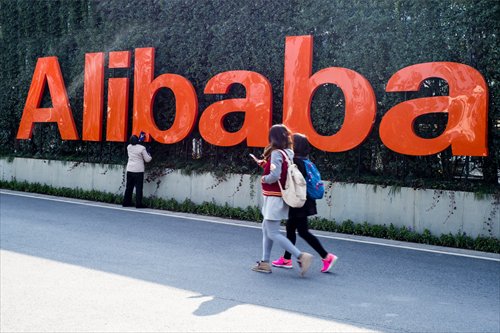Alibaba denies US allegations
Firm accused of failing to tackle fake goods

Alibaba employees at the e-commerce giant's Hangzhou headquarters in February Photo: CFP
Chinese e-commerce giant Alibaba Group Holding refuted on Tuesday the allegations made by a US industry group that the company is not interested in tackling the issue of counterfeit products being sold on its taobao.com marketplace.
"Alibaba Group is dedicated to the fight against counterfeits because the health and integrity of our marketplace depends on consumer trust," an Alibaba spokesperson said in a statement e-mailed to the Global Times on Tuesday.
Alibaba's comments came a week after the American Apparel and Footwear Association (AAFA), a US industry group that represents 1,000 global brands, filed two separate complaints to the US Securities and Exchange Commission (SEC) and the US Trade Representative (USTR) on April 8, saying that Alibaba's taobao.com platform is "one of the biggest platforms for counterfeit goods worldwide."
In its letter to the USTR - which was also published on the AAFA website - AAFA CEO and President Juanita Duggan suggested that the agency should put taobao.com back on the USTR Notorious Markets List this year in order to deliver a strong message. The USTR publishes the list annually in an effort to put pressure on dealers of fake goods, but it removed taobao.com from the list in 2012.
The AAFA also suggested that Alibaba shut down any store that violates copyright rules, even if it is for the first time. Currently, the company's policy is to shut down any store that violates copyright rules three times.
In response to the AAFA complaint, Hangzhou-based Alibaba listed its anti-counterfeit measures in Tuesday's statement. The company said it uses data mining technology to analyze and track transactions involving fake products and has online complaint platforms for brand owners to report any infringements.
The company also said that it would continue to work with Chinese public security, copyright and intellectual property agencies to curb sales of counterfeit products on taobao.com.
This was not the first time this year Alibaba has come under fire over the issue of counterfeit goods. On January 28, China's State Administration for Industry and Commerce (SAIC) published a strongly worded white paper based on talks with the company in July 2014, claiming that the company had previously failed to crack down on sales of counterfeit products.
Based on the white paper, five US law firms, led by San Diego-based Robbins Geller Rudman & Dowd LLP, filed class action lawsuits against Alibaba on January 30 over possible securities fraud, according to media reports.
The lawsuit accused Alibaba of not fully disclosing its meeting with the SAIC before the company's record-setting $25 billion IPO on the New York Stock Exchange in September 2014.
Following the SAIC's accusations and the class action lawsuit, the SEC requested information about the company's dealings with the Chinese authorities over sales of fake goods.
"As a platform that provides a marketplace for third parties, it is difficult to crack down on all illicit activities," Ala Musi, director of the policy and law committee of the Beijing-based China E-commerce Association, told the Global Times on Tuesday. "The company has been trying to solve the issues and I think there have been some improvements," he noted.
The technical difficulty of a crackdown is one problem, but another potential problem is the risk of making changes that might put off vendors and customers, particularly as the company has recently suffered weaker-than-expected financial performance.
In the fourth quarter of 2014, the company posted net income of $964 million, down 28 percent year-on-year, while its revenue was $4.22 billion, lower than analysts' estimate of $4.45 billion.
"I can find pretty much anything I want [on taobao.com] and when I find something so much cheaper than an original product, I'm sorry but it's tempting," a 30-year-old Beijing resident surnamed Sun told the Global Times on Tuesday.
"If that part disappears, taobao.com might lose some attraction for some customers and maybe it's a dilemma for Alibaba," she said, admitting that she had bought fake products before on taobao.com, such as US-branded text-books and a dress that was a counterfeit version of one made by an international brand.
"Some of the stores from which I bought pirated books had disappeared when I went back to look for them again, but it is quite easy to find alternative stores on taobao.com," Sun said.